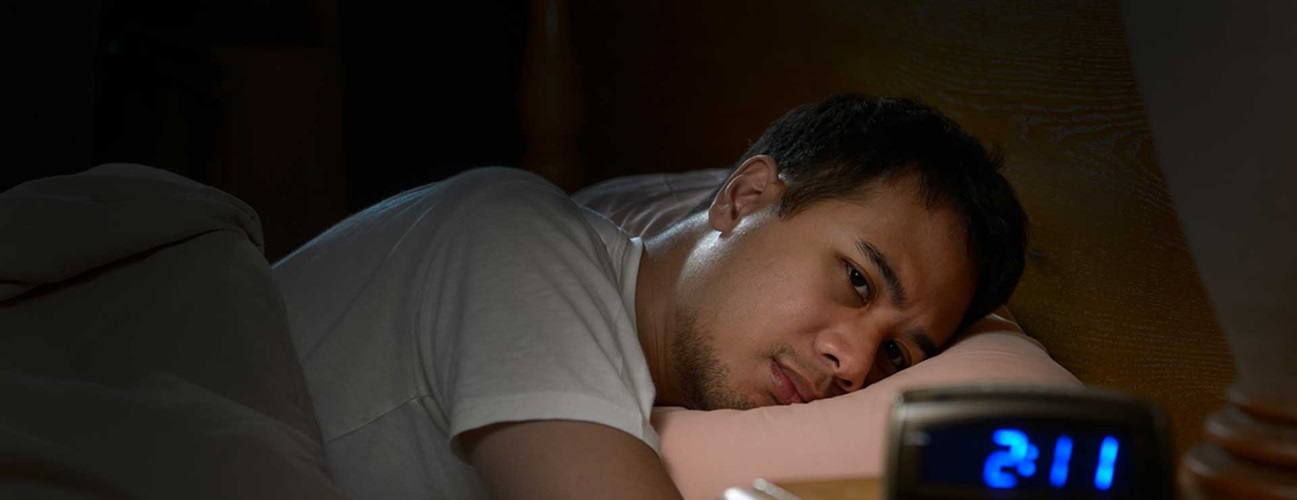How to Sleep Better: Start with Your Doctor
“Embarrassment, difficulty describing the problem, or believing poor sleep is normal can all get in the way of talking with a health care professional about sleep,” says Johns Hopkins sleep expert Sara Benjamin, M.D. “But a conversation is the first step toward treating sleep disorders and waking up refreshed.”

Often, one of these four factors holds people back from discussing their trouble sleeping. Here’s what you should know about how to speak up—and how to sleep better.
Sleep Challenges
You Rely on Alcohol or Meds to Sleep
Alcohol may help you fall asleep, but it interferes with deep, restful slumber. Over-the-counter sleep remedies are OK for most people once in a while, but they can leave you feeling drowsy, interfere with balance, raise your risk of dementia, and interact with other medications, Benjamin says. Using medications not intended to help with trouble sleeping—such as an antianxiety or pain drug—could cause side effects and may interfere with deep sleep too.
What to tell your doctor: Take a deep breath and honestly share what’s going on. “There are better, safer options that will help you with trouble sleeping,” Benjamin says. “In addition, your doctor should know about all the medications and supplements you take, as well as the amount of alcohol you typically drink or cigarettes you may smoke.”
You Think Poor Sleep Is Normal Sleep
“If your dad and uncle were loud snorers, or family members always talked about feeling extremely tired during the day, you might think that’s just the way it is for everyone,” Benjamin says. “There are some changes with sleep that come with aging, and your doctor can help you sort out what type of changes reflect normal aging and what problems need more evaluation.”
What to tell your doctor: If you have trouble falling asleep or staying asleep, if you don’t feel refreshed in the morning, or if your bed partner tells you that you seem to stop breathing and gasp for air during sleep, tell your doctor. You may have a sleep disorder that can be treated.
Your Doctor Hasn’t Asked About Sleep
“Many primary care practitioners request sleep information in health questionnaires their patients fill out, but they don’t ask every time,” Benjamin says. “One reason is that you may not look tired. People try to look their best when they come to a doctor’s appointment.” In one National Sleep Foundation poll, doctors said sleep was crucial to good health, yet most said a conversation was more likely to happen if a patient brought it up.
What to tell your doctor: Don’t wait. If your visit is coming to a close with no mention of sleep, bring up any trouble sleeping yourself. If you can’t fit a conversation about sleep into your visit, schedule a separate appointment, Benjamin suggests. “That way you and your doctor can focus on this important part of your health.”
You’re Not Sure What to Say
“If someone else in your household tells you that you gasp or snort or snore at night, you may not know quite how to describe what’s happening,” Benjamin says. “You may also feel that just saying ‘I have trouble sleeping’ or ‘I feel tired’ is too vague.”
What to tell your doctor: Ahead of time, give some thought to this information your doctor will find useful:
- Your sleep schedule
- How often you have trouble sleeping
- How long it takes you to fall asleep, how many times you wake up, and how long it takes you to go back to sleep
- Whether you feel tired or refreshed in the morning—and whether you feel tired during the day
- If you snore, gasp, choke, or snort at night
- If you ever fall asleep or feel extremely drowsy during the day, such as when you’re driving
“You can rely on your doctor to ask the right follow-up questions about your trouble sleeping and any possible sleep disorders,” Benjamin says.
Try It Keep a Simple Sleep Diary
If you’d like to give your doctor more information about your sleep concerns, try keeping a sleep journal for three or four nights before your appointment, suggests Johns Hopkins sleep expert Sara Benjamin, M.D. Include the time you fell asleep and woke up; overnight wake-ups and how long it took to get back to sleep; whether you felt refreshed or tired in the morning; any naps you took during the day; whether your bed partner noticed that you snored or gasped for breath.






